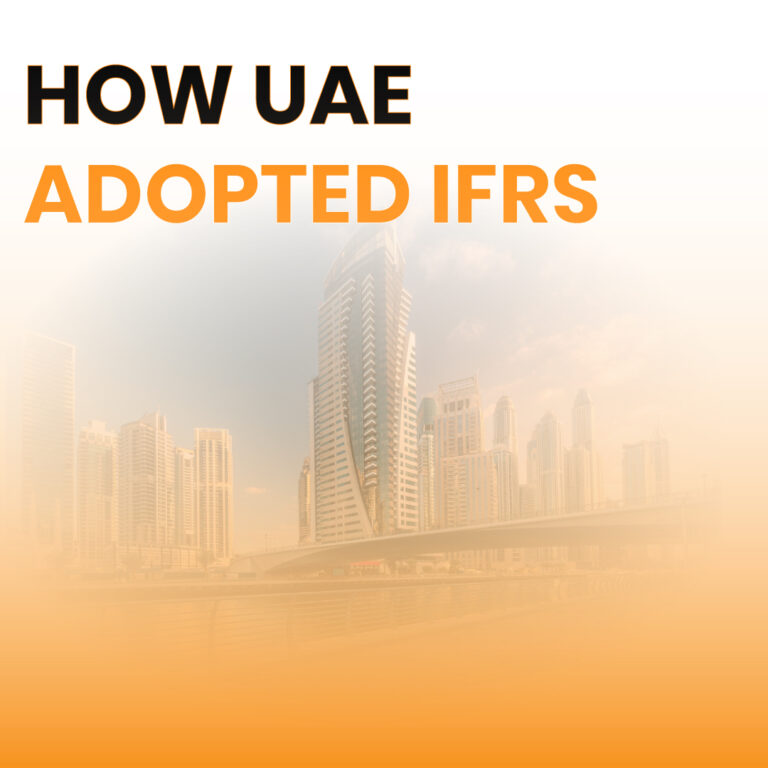“WHAT HAPPENS WHEN GLOBAL ACCOUNTING MEETS UAE LAW?”
The UAE IFRS adoption is quite well-known; this country has been very welcoming to the global financial reporting standards. The UAE’s laws have supported this new change in accounting and business landscapes; the evidence of the said support or acceptance is the fact that the UAE IFRS adoption is mandatory for all businesses in the country. Nonetheless, this advancement in the business or finance sectors can not be questioned at all, as it has served the organizations rightfully by adding more value. In the advanced financial world where transparency, accuracy, and comparability of finances matter so much, the IFRS have met all of the said industry demands.
The UAE IFRS adoption has been quite prosperous for the country, as it leads to an increased number of investors, maintains trust, and enables the country to do international trading. Despite all the benefits this change brings to the table, the said financial standards need to align with the government’s law; through this blog, you can explore more about the reporting standards and the government law’s alignment more efficiently.
THE LEGAL FOUNDATION OF IFRS IN THE UAE
The UAE IFRS adoption is aligned with or approved by both sector-specific regulations and federal legislation, allowing these standards to be easily followed in the country’s business dynamics.
1: FEDERAL COMMERCIAL COMPANIES LAW
Through Federal Law No. 2 of 2015, Article 27 of the Commercial Companies Law of the UAE, the essential requirement came forward, which mandates all companies in the region to follow International Accounting Standards for preparing financial statements. This requirement made the practice of IFRS standards very common in the country; however, the law doesn’t specify International Financial Reporting Standards (IFRS), yet the regulatory authorities and the Ministry of Economy have recognized IFRS as the effective framework that needs to be followed in the UAE.
2: UAE TAX LAW & THE CORPORATE TAX REGIME
From 2023, the federal corporate tax in the UAE reinforced the effective use of IFRS standards in business and finance sectors; under Article 20, it was mandated for companies to determine taxable income based on financial statements prepared using IFRS. Following this practice so far has proved to be beneficial for the organizations as it ensures transparency and consistency between accounting and tax reporting.
3: REGULATORY BODIES & FREE ZONE AUTHORITIES
All the regulatory bodies, including the Securities and Commodities Authority, Central Bank of the UAE, Insurance Authority, and Free zones such as ADGM and DIFC, have adopted IFRS and support the reinforcement of these international financial standards. These regulatory bodies have played an essential role in making UAE IFRS adoption common in the country by not only adopting it themselves but also influencing others to do so. In return, the IFRS standards have proved to be value-adding for the organizations by ensuring utmost clarity, comparability, and consistency on an international level.
CONCLUSION
It is well-known that the UAE has not only adopted the IFRS standards, but it has made it mandatory for companies or businesses to prepare financial statements with IFRS. Obviously, this big change in the financial and business sector must be in good alignment with the UAE’s laws and regulations to be adopted rapidly. UAE law has, however, made it mandatory for companies to follow international accounting standards; however, the law has not mentioned IFRS by name, but regulatory bodies and free zone authorities in the UAE recognize and incorporate IFRS standards. Not only approval by law and legislation, but the acceptance & recognition from regulatory bodies have played a key role in supporting International Financial Reporting Standards (IFRS).
FREQUENTLY ASKED QUESTIONS (FAQs)
Q1: What are the key components of implementing IFRS in the UAE?
Ans: The key components that support the implementation of IFRS in the UAE are DIFC and ADGM; these were the early adopters of International Financial Reporting Standards. Other than that, a key role was played by the auditors and professional bodies to support the incorporation of IFRS in preparing financial statements.
Q2: Is IFRS certification in Dubai easily available?
Ans Yes, the IFRS certification in Dubai is quite easily available; many credible local as well as international learning providers offer online and onsite academic support and help aspirants achieve this value-adding certificate.
Q3: How is IFRS interlinked with the ACCA course in the UAE?
Ans The ACCA course in the UAE has always been quite flexible in adopting new industry advancements; the incorporation of IFRS standards has been a huge change in the finance industry. Therefore, ACCA adapts this advancement and trains its aspirants as well as professionals with expertise to succeed in the financial world.





